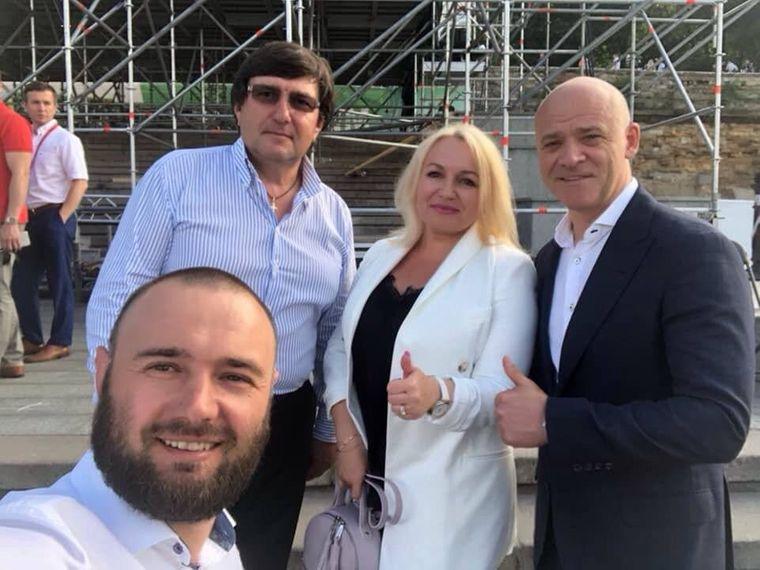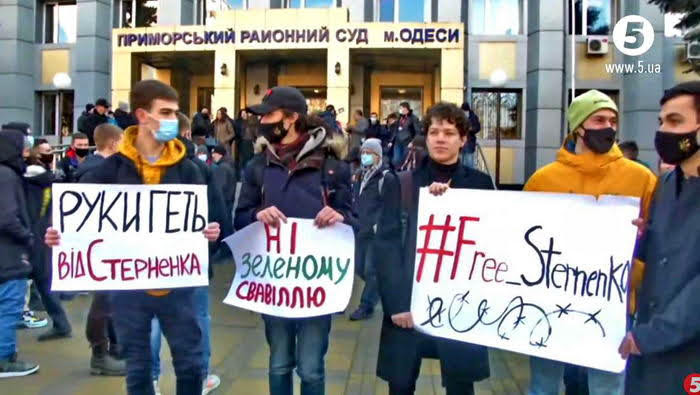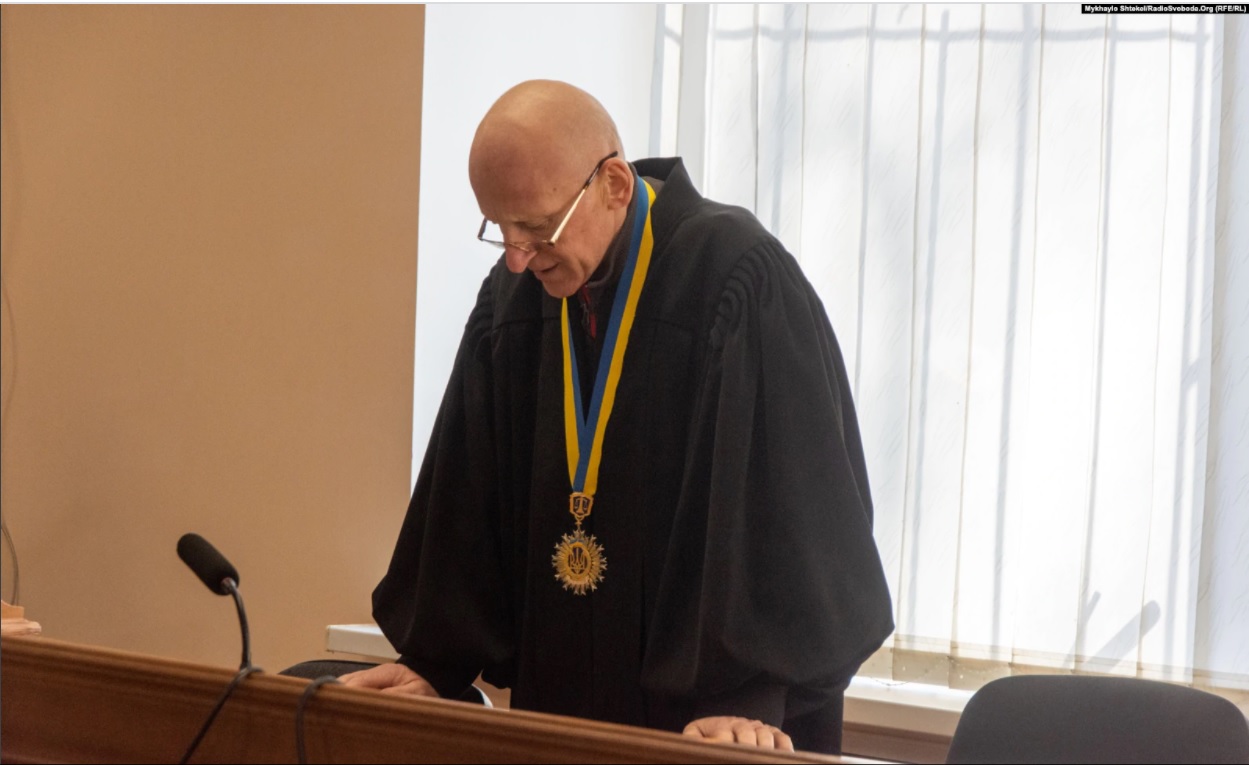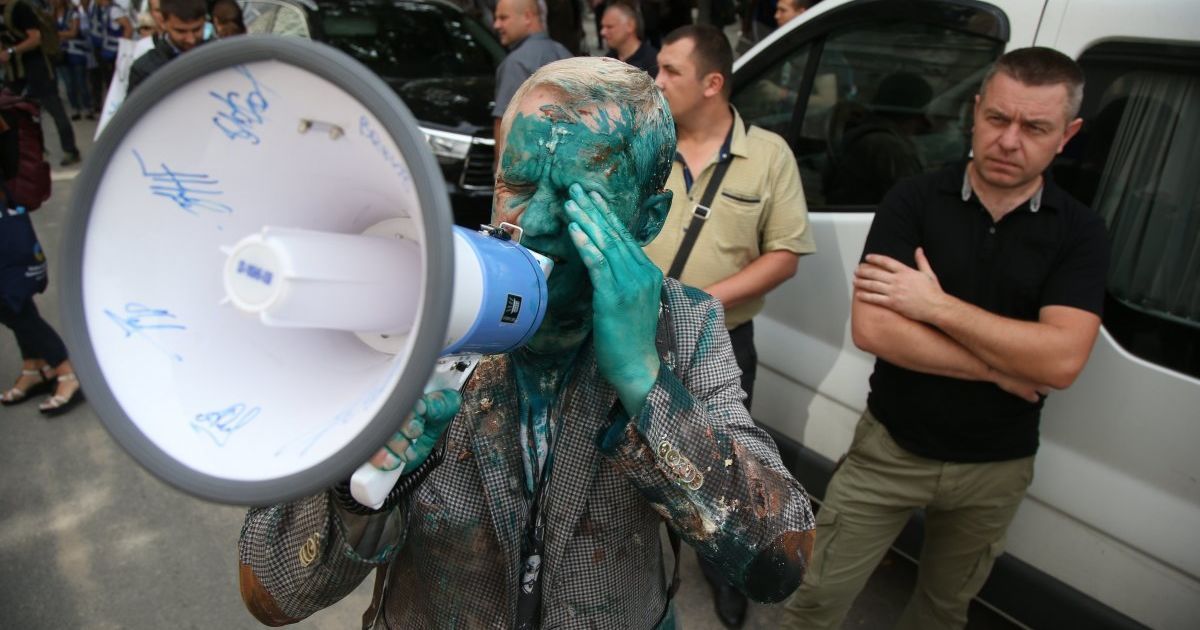On 23 February, the Primorsky Court of Odesa ruled to imprison Serhiy Sternenko, a civic activist from the south-Ukrainian city and one of the greatest enemies of the local authorities, for 7 years and three months and to seize half of his property.
The court found him guilty of abduction by a prior conspiracy, robbery, and illegal possession of weapons. Sternenko denies the charges and claims they were ordered by the Odesa mayor Trukhanov, with whom the activist had clashed.
The case, dating back seven years, popped up recently as previous attempts to imprison him in another case have not yet yielded results. Sternenko considers the decision politically motivated. It already triggered a wave of protests across Ukraine.
As of late evening, protests broke out throughout Ukraine and even abroad. Thousands gathered near the President's Office in Kyiv. However, police blocked the entrance to the yard of the building. Clashes between police and the protesters erupted; 24 were detained.
https://www.facebook.com/watch/?v=261666682121729
https://www.facebook.com/100001525230251/posts/3915406665186803/
https://www.facebook.com/ukrpravda/posts/4370254322989194?__cft__[0]=AZXTopkL3kqKyVOD-1jybu42QeEOUOzZXn7HbfR72T6vqu94Ij2sIkyEmgMlAA3tixzC_H6o4wzwZnlnFm7t_lsrtj6DteEv4i0n-1czncgnLbQwYTBRLDDx7n8nE1Fhoe_CyH3wFDoSHSfmerHOx_Gm&__tn__=%2CO%2CP-R
Case 1. Premeditated murder or the right to self-defense?
Last year, Serhiy Sternenko and the protests in his defense broke headlines.
In 2018, Sternenko, an anti-corruption whistleblower exposing the Odesa local construction mafia, fell victim to three attacks. During the last one, he was stabbed in the arm and suffered a head concussion, but fought back and mortally wounded one of the attackers while trying to defend himself. The other attacker fled the country.
While his complaints about the three attacks received no movement in court, with police claiming it “lost” material evidence of the assaults, last summer, the Security Service of Ukraine served Sternenko with a notice of suspicion, incriminating him with premeditated murder for the episode.
The hearings in the case were accompanied by street protests that were not so much in Sternenko’s support as for the right of any Ukrainian for self-defense. As well, the case underlined the problems of an unreformed judicial system.
This case is still ongoing. Last August, Sternenko received an indictment in it from the Security Service. It also started to be reviewed in court. From mid-June 2020, Sternenko was under house arrest until at the end of January 2021 he was bailed out by the Ukrainian lawmaker MP Roman Lozynsky (Voice party).
Last summer, the Ukrainian Helsinki Human Rights Union decried Sternenko’s criminal persecution as politically motivated.
Case 2. Kidnapping to obtain $11 and storing weapons?

Imprisoning Sternenko in another case turned out to be faster. Dating back seven years, the case involves accusations of kidnapping.
He coordinated and took part in numerous anti-Russian protests, such as boycotting concerts of stars who were noticed performing in occupied Crimea or Donbas.
Other self-described activities with the Right Sector, which he left in 2017, included campaigns against drug sales and against illegal construction, arguably Odesa’s most problematic issue. The majority of the city’s conflicts are due to the seizure of public property by construction companies, most of which are affiliated with the city mayor Hennadiy Trukhanov. Parks, coastal land, and areas of the city’s historic center are also threatened with destruction.
Some of Sternenko’s activities were controversial: for instance, Sternenko was involved in inciting mob justice through the “dumpster lustration” of officials perceived as corrupt.
Sternenko was also a vocal critic of Ukraine’s unreformed police and claims that local law enforcers, as well as mayor Trukhanov, were behind the attacks on him. After 2017, he is involved with pan-Ukrainian protests against Interior Minister Arsen Avakov and the movement demanding to bring the murderers of Kateryna Handziuk to justice. This anti-corruption activist from the south-Ukrainian city of Kherson is one of the many civic activists who suffered from attacks amid the inaction of national police headed by Avakov.
The events of that time were reconstructed by Ukrainska Pravda journalist Sonia Lukashova, who got acquainted with the materials of the case. According to a regional police department of Odesa Oblast, on 24 April 2015, newly-elected local lawmaker with Trukhanov's Doviriay Dilam party Serhiy Shcherbych sat in a car with two men and started talking with them. Several other men joined them, the car drove away towards Odesa, Shcherbych was beaten, tortured, fired at from a traumatic gun, and pressured to resign. Finally, UAH 300 was stolen from the victim, as well as credit cards and a firearm permit.
Then, the police version goes, the deputy was taken to a part in an Odesa district, where a "person in camouflage" again demanded Shcherbych resign and threatened him and his family with physical violence if he does not. Why the "person in camouflage" needed this is not known.
After Shcherbych was released, the official version goes, he filed a complaint with the police, who started investigating it as an abduction. According to the materials of the case, the next day, on 25 April, an investigative experiment was held and Shcherbych identified two of the men in the car as the accused -- Sternenko and Ruslan Demchuk, another Right Sector coordinator. The first notice of suspicion was issued by the court in June 2015.
But the police came with the notice to the accused only three months later, on 8 September 2015. Sternenko and Demchuk, were detained and incriminated with kidnapping local lawmaker Serhiy Shcherbych with the goal of “obtaining his funds in the amount of UAH 300 [$11].”.
Later, both were released on bail. Sternenko was also charged with illegal possession of weapons. He, however, said that he voluntarily surrendered the weapons to the law enforcers, and denied his involvement in this alleged kidnapping.
The case went to court in 2016, and had been stagnating there ever since. The victim, Shcherbych, had systematically ignored the court sessions, and the court was forced to order the police to find the deputy.
Possible political motivations
Sternenko stresses that Shcherbych is a deputy of the party Doviriay Dilam (Trust the Deeds), which is headed and controlled by Odesa mayor Hennadiy Trukhanov, whose corrupt networks Sternenko had been exposing.
He himself believes Trukhanov ordered his murder three times. Also, the activist accuses Prosecutor General Iryna Venediktova and deputy head of the President’s Office Oleh Tatarov of pressuring the court and prosecutors.
Regarding Sternenko’s previous case, on self-defence, Slidstvo.Info journalists revealed that last year, before being appointed to his position, Tatarov demanded the investigator of the Security Service serve Sternenko with a notice of suspicion in completed murder and attempted murder of two persons.
Suggesting that the desire to have Sternenko jailed comes from the very top of Ukraine’s government are the actions of Prosecutor General Iryna Venediktova. On the very first day in office, she announced in an interview that Sternenko should be served a notice of suspicion in the politically laden and controversial case.
At that time, according to Deputy Prosecutor General Viktor Trepak, who had been tasked with investigating cases of crimes committed against activists at Euromaidan, the murder of Handziuk, and Sternenko’s case over the death of his attacker, and who was held in high esteem by the aggrieved in those cases, the assessments conducted by the prosecution did not warrant any such suspicion.
Venediktova was unhappy to hear such an appraisal and Trepak was removed from his duties shortly after she assumed office.
- Read also: Prosecutor General turns the tables on corruption fighter who survived three murder attempts
Sternenko believes that the two influenced the recent developments in the kidnapping case, stating that the court process accelerated greatly. Previously, there was one hearing per month, but recently they were taking place once a week. His defense claims that the hearings did not take place because the aggrieved party did not show up.
“And now, during the last seven days, there were three.”
As the Mykhailo Zhernakov, head of the DEJURE foundation, put it, Sternenko’s case stagnated over five years because it was “obviously absurd” -- that Sternenko abducted Shcherbyna to earn $11, based on the sole testimony of Shcherbyna,
“And then suddenly, it’s pulled out and speeded up until a verdict. There is only one explanation -- the case on self-defense was falling apart, and to put Serhiy behind bars, another one needed to be taken out.”
A questionable judge and process

Given Sternenko’s reputation as a pro-Ukrainian and anti-corruption activist, and the resonance of the previous accusations levied against him, news of the new case spread like wildfire.
The court hearing on 23 February was overcrowded. Sternenko’s supporters gathered near the court building. Many traveled to Odesa from other cities. Among them were ex-acting Healthcare Minister Ulana Suprun, MPs Geo Leros, and Yaroslav Yurchyshyn.
The judge, Viktor Poprevych, has been accused of intransparent and unfair decisions.

“The judge Poprevych regularly gives grounds to assume with high probability that he has an economic, corrupt or other personal interest in decision-making,” the DEJURE Foundation NGO states, providing examples of the judge’s controversial decisions.
In 2017, a fire took place in a children’s camp, taking the lives of three children. The fire was caused by inadequate safety measures during a recent renovation. Nevertheless, the judge released the director of the camp on a small bail. In other cases, Poprevych had sided with drunk drivers.
The prosecutor's office claimed that the guilt of Sternenko and his colleague Ruslan Demchuk, was confirmed by the testimony of the victim, telephone billing, and witness statements. The witness allegedly said that she saw Shcherbych being dragged into a car and taken away in an unknown direction.
Judge Poprevych eventually recognized Sternenko guilty in all the articles incriminated against him: robbery (p.2 art. 187 of the Criminal Code) , abduction (p. 2 art 146 of the CC), and illegal storage of weapons (p.1 art. 263 of the CC). However, criminal charges were waived under the charge of abduction, due to a time-bar.
It appears there are multiple irregularities in the case and the way it was handled in court. Masi Nayyem, who is a lawyer but is not defending Sternenko, posted a legal analysis based on open sources and materials from the case provided by Sternenko on the eve of the court session.
In 2015 police came to search Sternenko’s house. During it, Sternenko voluntarily surrendered a pneumatic collection knife, and starting (noise) pistol. The reason for searches was Shcherbych’s complaint against Sternenko.
After the search, the police detained Sternenko and served him a notice of suspicion: he was accused of kidnapping Shcherbych in order to steal UAH 300 [about $11 - Ed].
Regarding the charge of storing weapons, Nayyem believes that the charge itself is void, as Ukraine lacks a law regulating the use of weapons, only a directive from the police. Moreover, Sternenko surrendered them voluntarily, and the pistol was not a firearm in the first place. Even if Sternenko did possess a lethal weapon, he would be exempt from responsibility of storing it if he handed it over, Nayyem writes.
Regarding the charges of abduction and robbery, they are based, Nayyem claimed, on solely Shcherbych’s testimony. The prosecutors did not prove that Shcherbych was kidnapped or robbed, nor that Sternenko was involved. It appears that during the court hearing, however, the judge additionally referred to a witness who was never questioned in court, in violation of procedures.
An additional irregularity is that the materials of the case reportedly refer to the victim of the case, Shcherbych, being in two places simultaneously: in the hospital for treatment and at an investigative experiment. This, Nayyem says, points to a possible fabrication of the case.
Writing in Ukrainska Pravda, journalist Sonia Lukashova raises some additional questions.
Regardless of political sympathies (pro-Russian ones of Shcherbych, who during the Euromaidan revolution was spotted coordinating brigades of titushky, men with experience in combat arts hired to attack and brutalize protesters on behalf of the Yanukovych regime; and Sternenko's membership in the ultranationalist Right Sector), there are glaring questions casting a shadow on the court process:
Why had the police come after the suspects only after four months after the supposed crime? If it really was a violent crime -- kidnapping and torture -- and if Shcherbych immediately indicated his attackers, why the delay? Did the investigation either ignore the criminals and not protect the victim, or did it falsify the materials of the case? In the best case, the authorities did not carry out their work with due diligence; in the worst case, they became criminals themselves.
What was the motive of the crime? The "funds in the amount of UAH 300" one is hardly believable. Moreover, the victim and investigation told about a political motive -- demands that Shcherbych resign from being a deputy of the local council. But the official accusation is "robbery." Why?
What really happened with Shcherbych? That is really the main question, and the Ukrainian state needs to have found an answer five years ago, as its responsibility is to establish justice. Right now, there are glaring inconsistencies with the official version.
"So far, neither the victim or the accused have received this justice. ...
It is obvious that someone broke the law in this case. Either by kidnapping Shcherbych or falsifying the facts. This someone has to answer in court," Lukashova sums up.
[hr]
Ruslan Demchuk, the second accused in the case, was sentenced to the same punishment.
Sternenko was taken to the pretrial detention center right from the court
His lawyer Vitaliy Kolomiets, informed that the defense is planning to appeal the decision as soon as possible.
After the decision, the Voice party started to consider collecting signatures for Venediktiva's resignation, Yurchyshyn informed.
Meanwhile, the next wave of protests is planned for Saturday, 27 February.





